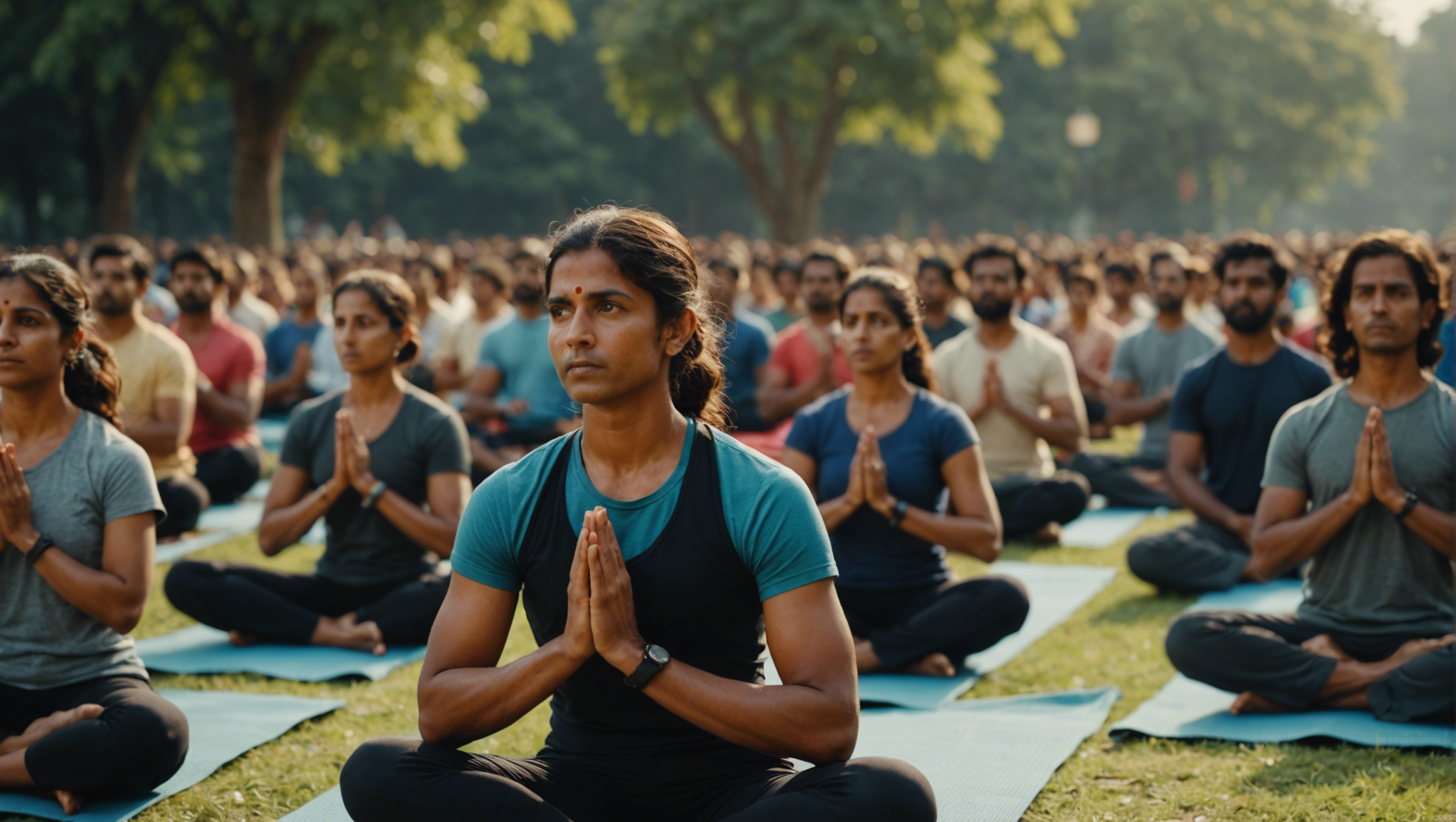Commencement Of Yoga Day Celebrations In India: A Historical Overview
The Genesis of Yoga Day Celebrations in India: Unraveling Its Historical Roots
Yoga, a practice deeply rooted in Indian spirituality, culture, and history, has transcended geographical boundaries to become a global phenomenon celebrated by millions worldwide. Its origins, steeped in the ancient philosophies of India, have evolved over millennia, culminating in the establishment of an international day dedicated to its practice and philosophy. This culmination is not merely a testament to yoga’s global appeal but also an acknowledgment of its profound benefits for both mind and body.
The Historical Journey of Yoga in India
Yoga’s journey began over 5,000 years ago in the Indus-Sarasvati civilization in Northern India. The word ‘yoga’ itself, derived from the Sanskrit root ‘yuj’, means to join or to unite, symbolizing the union of body and consciousness. Historically, yoga was more than just a method of teaching; it was a way of life that encompassed meditation, ethos of non-violence, and a harmonious coexistence with the universe.
As centuries passed, yoga evolved into a diverse set of practices, with various schools, teachers, and texts emerging, each adding their layers of interpretation and methodology to the practice. By the time it reached the second century, the classical period of yoga was ushered in by Patanjali, often called the "father of yoga." Patanjali’s Yoga Sutras became a seminal text, codifying the practice into an eight-fold path of Ashtanga Yoga. Despite these evolutions, the essence of yoga – the quest for the unity of mind, body, and spirit – remained unchanged.
The Proposal and Recognition of an International Yoga Day
The proposal to internationally recognize a day for yoga came from a modern context, reflecting its global resonance and India’s soft power on the international stage. On September 27, 2014, during his address to the United Nations General Assembly, the Prime Minister of India, Narendra Modi, suggested the idea of an International Day of Yoga. Arguing that "Yoga is an invaluable gift of India’s ancient tradition," he proposed June 21, the longest day of the year in the Northern Hemisphere, to be recognized as International Yoga Day. This date was chosen to reflect the significance of the Summer Solstice, a time of spiritual significance in many cultures, and its connection to the practice of yoga, which often symbolizes natural, universal truths.
The United Nations, recognizing the universal appeal and inherent unifying essence of yoga, proclaimed June 21 as the International Day of Yoga on December 11, 2014. The resolution saw a record number of co-sponsors, with 177 member states endorsing the proposal, underscoring the widespread acknowledgment of yoga’s benefits and its capacity to transcend cultural and national barriers.
Celebrating Yoga Day: Unity in Diversity
The official declaration of International Yoga Day marked the beginning of a new chapter in the long history of yoga. Across India, millions now gather in mass yoga sessions, taking place in public spaces, schools, and community centers, celebrating not only the practice itself but the spirit of unity and peace it embodies. These celebrations are not limited to yoga enthusiasts but include people from all walks of life, reflecting the inclusive nature of yoga.
Moreover, the celebrations go beyond the mere physical aspects of yoga; they include discussions, workshops, and events aiming to educate the public about the benefits of yoga for health, spirituality, and mental well-being. The day serves as a platform for yoga practitioners to share their knowledge and experiences, fostering a community of wellness and mindfulness.
The Global Reverberation of Yoga Day
Since its inception, International Yoga Day has seen participation from across the globe, with hundreds of countries hosting their yoga sessions and events. This global observance has turned into a veritable movement, showcasing yoga’s universal appeal and its power to bridge diverse cultures and peoples. Through the annual celebration of yoga, the world collectively acknowledges its profound impact on the physical, mental, and spiritual well-being of humanity.
The genesis of Yoga Day celebrations in India and its subsequent recognition by the United Nations marks a significant milestone in the journey of yoga. It encapsulates a centuries-old practice’s evolution from an ancient spiritual pursuit into a global phenomenon that continues to inspire and unify people across the world.
The International Acceptance and Recognition of Yoga Day
Global Embrace of a Timeless Tradition
The rapid global acceptance and recognition of Yoga Day marks a significant moment in the international cultural landscape, reflecting a broader appreciation for this ancient practice. Originating in India over 5,000 years ago, yoga has evolved from a spiritual and ascetic discipline into a worldwide phenomenon, celebrated for its health, relaxation, and mindfulness benefits. This widespread recognition culminated in the declaration of International Yoga Day by the United Nations, affirming yoga’s universal appeal and its place in the global health and wellness conversation.
The United Nations Resolution: A Landmark Decision
The United Nations’ decision to proclaim June 21 as International Yoga Day was a landmark achievement for yoga’s global recognition. This resolution, adopted by consensus in 2014, was supported by a record number of member states, highlighting the worldwide respect and enthusiasm for yoga. The choice of June 21, the longest day in the Northern Hemisphere, holds symbolic significance, reflecting light, clarity, and consciousness attributes that yoga strives to bring into one’s life.
Enhancing Health and Harmony
Yoga’s holistic approach to well-being is a key factor in its international acceptance. It offers a unique blend of physical postures, breathing techniques, meditation, and lifestyle principles that collectively enhance physical, mental, and spiritual health. By promoting harmony between the mind and body, yoga has become a valuable tool in the global fight against stress, anxiety, and lifestyle-related diseases, resonating with the modern quest for a balanced and healthy lifestyle.
Cultural Exchange and Adaptation
The journey of yoga across borders is a testament to cultural exchange and adaptation. From the ascetic yogis of ancient India to modern studios in bustling cities around the world, yoga has been embraced and adapted into various forms, making it accessible to a diverse audience. This adaptability has allowed yoga to thrive in different cultural contexts, incorporating local practices and beliefs while preserving its core essence.
Scientific Research Bolstering Acceptance
The growing body of scientific research supporting yoga’s health benefits has played a crucial role in its international acceptance. Numerous studies have documented the positive effects of yoga on physical health, including improved flexibility, strength, and posture, as well as on mental health, reducing symptoms of stress, depression, and anxiety. This evidence-based approach has bolstered yoga’s credibility and encouraged its integration into health and wellness programs worldwide.
Challenges and Controversies
Despite its widespread acceptance, the international recognition of Yoga Day has not been without challenges and controversies. Issues of cultural appropriation, commercialization, and the dilution of yoga’s spiritual and philosophical roots have sparked debates within the yoga community and beyond. These discussions highlight the complexities of globalizing a cultural practice and the need for sensitivity and respect towards its origins and traditions.
The Future of International Yoga Day
As International Yoga Day continues to grow in prominence, its potential to foster global unity, health, and peace becomes increasingly evident. By focusing on the inclusive and universal aspects of yoga, this annual celebration can serve as a bridge between cultures, promoting mutual understanding and respect. The future of International Yoga Day lies in its ability to adapt, evolve, and continue to inspire individuals around the world to embrace yoga’s transformative power.
The global acceptance and recognition of Yoga Day underscore the universal appeal of yoga as a practice for physical, mental, and spiritual well-being. As it moves forward, the challenge will be to maintain the integrity and depth of this ancient discipline while making it relevant and accessible to a global audience. The story of International Yoga Day is a vivid illustration of how traditional practices can transcend their cultural origins, becoming global movements that promote health, harmony, and peace.
Cultural Significance and Practices Surrounding Yoga Day in India
The Genesis and Evolution of Yoga Day Celebrations in India
Yoga, a spiritual and ascetic discipline rooted deeply in the Indian ethos, encompasses meditation, breath control, and the adoption of specific bodily postures widely practiced for health and relaxation. The annual observance of Yoga Day in India marks not just a celebration of this ancient tradition but underscores its integration into the cultural and spiritual tapestry of the country. The inception of International Yoga Day, officially recognized on June 21st, came about through the profound vision of India’s Prime Minister Narendra Modi, during his address to the UN General Assembly in 2014. This proposition, not only garnered international acclaim but also set the stage for an unprecedented acknowledgment of India’s spiritual and cultural heritage on a global platform.
Unveiling the Cultural Significance
The essence of Yoga Day transcends the mere performance of asanas; it’s a day imbued with deep cultural significance, serving as a bridge connecting India’s past with its present and future. In a country where spiritual practice is an intricate part of daily life, Yoga Day amplifies the holistic vision of yoga—promoting physical well-being while encouraging mental and spiritual harmony. It’s a testament to the enduring legacy of India’s sages and seers who, millennia ago, discerned yoga as a means to elevate the human spirit and foster universal solidarity.
Traditional Practices and Contemporary Celebrations
Across the length and breadth of India, Yoga Day unfurls with much fanfare, combining traditional practices with contemporary celebrations. At the crack of dawn, millions assemble in public spaces, schools, and institutions, rolling out their yoga mats to participate in sessions led by yoga practitioners. These gatherings not only spotlight the diversity of yoga forms native to different regions of India but also symbolize the unity and collective consciousness of its people. Significant landmarks and historical sites often become the backdrop for mass yoga sessions, visually conveying the message of unity and peace.
Yoga in the Digital Age: Expanding Reach and Accessibility
The digital wave has notably expanded the reach and accessibility of Yoga Day celebrations across India. Virtual yoga sessions and live streams have democratized access, enabling those in remote areas or with limited mobility to partake in these celebrations. Social media platforms buzz with participation, as individuals share their experiences, fostering a sense of global community. This digital engagement not only enhances visibility but also encourages a dialogue on the importance of yoga in fostering a balanced lifestyle.
Engaging the Youth: Shaping Future Custodians of Yoga
Fostering an interest in yoga among the youth is pivotal to its enduring legacy. Schools and educational institutions play a crucial role in this endeavor, incorporating yoga into their curriculum not merely as a physical exercise but as a discipline that nurtures mindfulness, discipline, and resilience. By engaging the youth, Yoga Day celebrations in India are not just commemorating a tradition but are actively shaping the future custodians of yoga. This engagement is vital to ensuring that the practice continues to evolve while staying true to its roots.
The Global Echo of India’s Yoga Day Celebrations
India’s Yoga Day celebrations resonate well beyond its borders, evoking a global consciousness about the importance of wellness and holistic health. By showcasing the rich heritage of yoga, India has catalyzed a worldwide movement that embraces mindfulness and well-being. The global participation in Yoga Day is a testament to the universal appeal of yoga and its relevance in addressing contemporary challenges related to health and stress.
Yoga Day celebrations in India, thus, serve as a beacon of the country’s enduring cultural and spiritual legacy. It stands as a reminder of the transformative power of yoga, capable of transcending geographical and cultural boundaries to unite humanity. Through its inclusive and integrative approach, Yoga Day elucidates a path toward greater health, harmony, and peace, both individually and collectively.
The Impact of Yoga Day on Global Wellness and Health Consciousness
Elevating Global Wellness Through Yoga
The observance of International Yoga Day marks a significant point in the global calendar, emphasizing wellness, peace, and health consciousness. This day, celebrated annually on June 21, has transcended its origins, becoming a worldwide phenomenon that highlights the ancient practice of yoga as a cornerstone for holistic health. The impact of this celebration on global wellness and health consciousness cannot be overstated, with millions embracing yoga to improve their physical, mental, and spiritual well-being.
Yoga: A Unifying Force for Health
Yoga, with its roots deeply embedded in the ancient Indian philosophy, has emerged as a unifying force across the globe. Its appeal lies in its versatility and adaptability, catering to various needs and preferences. From the bustling cities in the West to the quiet villages in the East, yoga has become a common language for health and wellness. The practice does not discriminate by age, gender, or fitness level, making it accessible to everyone. This inclusivity has played a crucial role in its global adoption and the consequent rise in health consciousness.
Impact of Yoga on Physical and Mental Health
The holistic benefits of yoga are well-documented, ranging from enhanced physical flexibility and strength to improved mental health and stress reduction. Regular practice can lead to significant improvements in cardiovascular health, respiratory function, and balance. Furthermore, yoga’s emphasis on mindfulness and meditation has been linked to reduced levels of anxiety and depression, offering a natural remedy for the stresses of modern life. By providing a comprehensive approach to wellness, yoga encourages a deeper understanding and appreciation of the body, leading to more informed health decisions and lifestyle choices.
The Role of International Yoga Day in Promoting Wellness
The initiation of International Yoga Day has played a pivotal role in raising awareness about the benefits of yoga and encouraging a shift towards more holistic health practices. This global event offers a platform for sharing knowledge, experiences, and practices, fostering a sense of community among yoga enthusiasts around the world. Through workshops, public sessions, and online classes, the day serves to demystify yoga, making it more accessible to the uninitiated and deepening the practice for seasoned yogis. The widespread participation and coverage of the event have significantly bolstered the visibility of yoga, driving its integration into public health initiatives and wellness programs.
Yoga’s Influence on Lifestyle and Sustainability
Beyond the immediate health benefits, yoga promotes a lifestyle that is in harmony with nature and conducive to sustainability. The mindfulness cultivated through yoga practice encourages a conscious approach to consumption and living, resonant with eco-friendly and sustainable choices. This aspect of yoga has gained importance in global discussions on environmental preservation and sustainability, aligning with broader wellness goals that include the health of the planet.
Future Trends in Global Wellness through Yoga
As awareness and adoption of yoga continue to grow, its influence on global health trends and policies is becoming increasingly significant. We are witnessing a gradual shift towards preventive healthcare, with yoga at the forefront of this movement. Governments, corporations, and educational institutions are beginning to recognize the value of incorporating yoga into wellness programs, leading to a more health-conscious and balanced society.
The celebration of International Yoga Day has undoubtedly played a critical role in this transformative journey towards global wellness. By continuing to promote yoga and its benefits, we pave the way for a healthier, more mindful, and unified world.
Engaging in Yoga for Holistic Well-being
The journey towards global wellness and health consciousness through yoga offers a promising path. It invites individuals to explore the depths of their physical, mental, and spiritual capacities. By engaging in yoga, individuals contribute to a collective movement towards better health, peace, and unity. The impact of International Yoga Day goes beyond a single date; it’s a continuous celebration of life, wellness, and the timeless wisdom embodied in yoga.
Future Trajectory: Evolving Trends and Potential of Yoga Day Celebrations
Understanding the Global Expansion of Yoga
The annual celebration of Yoga Day has garnered international attention, emphasizing not only the physical but also the spiritual and mental benefits of yoga. This universally embraced occasion speaks volumes about yoga’s journey from ancient practice to global wellness phenomenon. The future trajectory of Yoga Day celebrations is poised to evolve, tapping into emerging trends and unlocking potential that could further elevate yoga from a traditional practice to a cornerstone of global well-being and intercultural unity.
Embracing Digital Platforms for Wider Reach
The digital revolution has reshaped how yoga is practiced and celebrated. Online platforms and social media have become integral in making Yoga Day accessible to millions worldwide, breaking geographical barriers. Live-streamed classes, virtual workshops, and global meditation sessions have the potential to enhance participation exponentially. The focus on digital inclusivity can foster a sense of global community, making yoga more accessible to those in remote or underserved areas.
Integrating Mental Health Awareness
As conversations around mental health become more mainstream, Yoga Day offers a unique opportunity to integrate mental well-being into its core message. By emphasizing yoga’s capacity to alleviate stress, anxiety, and depression, future celebrations could serve as powerful platforms for mental health advocacy. Initiatives could include collaboration with mental health organizations, themed events focusing on mindfulness and stress reduction, and resources highlighting yoga’s mental health benefits.
Promoting Cultural Exchange and Diversity
Yoga’s roots in ancient Indian philosophy provide a rich tapestry for cultural exchange. Future Yoga Day events could further celebrate this heritage while promoting diversity by incorporating elements from different yoga traditions around the world. This could involve showcasing different styles of yoga, stories from various cultures on how yoga has influenced their lives, and events that highlight yoga’s unifying power despite diverse practices and interpretations.
Fostering Community and Environmental Consciousness
Yoga teaches awareness and respect for all living beings and the environment. these values, future Yoga Day events could also champion sustainability efforts. Community clean-up drives, tree planting ceremonies, and discussions on eco-friendly practices within the yoga community could merge the principles of yoga with actionable environmental stewardship.
Enhancing Scientific Research and Holistic Health
Evidence-based practices hold the key to yoga’s integration into healthcare. Increasing investment in scientific research to explore yoga’s full potential in preventive and therapeutic health care could be a major trend. Future celebrations might highlight groundbreaking studies and encourage holistic health approaches, where yoga is part of integrative medicine practices.
Strengthening Yoga in Education
Embedding yoga into educational systems could shape future generations to be more mindful, resilient, and empathetic. Yoga Day can be an impetus for developing curriculum-based yoga programs, teacher training in yoga education, and events that promote yoga among the youth. This strategic inclusion can play a pivotal role in nurturing physical and mental well-being from a young age.
Exploring Technological Innovations
Wearable technology, virtual reality, and other tech innovations offer exciting possibilities for enhancing yoga practice. Future Yoga Day celebrations could incorporate technology demos, where participants explore new ways to practice yoga using the latest gadgets. This fusion of tradition and technology could attract a younger audience and make yoga practice more interactive and engaging.
These evolving trends and potential developments suggest a future for Yoga Day celebrations that go beyond mere physical practice. The holistic expansion into digital inclusivity, mental health, cultural exchange, environmental consciousness, scientific research, education, and technological innovation can transform Yoga Day into a multifaceted platform. This platform not only promotes physical well-being but fosters global unity, environmental sustainability, and mental health awareness—an enduring testament to yoga’s timeless relevance and boundless potential.
Conclusion
The journey of Yoga Day from its inception in India to becoming a globally recognized event encapsulates not just the adoption of a practice but the universal acceptance of a philosophy that stands at the confluence of wellbeing, mindfulness, and cultural heritage. Tracing the genesis of Yoga Day back to its roots provides an enlightening context to understand how deeply integrated yoga is within the Indian ethos, serving not only as a form of physical exercise but as a spiritual practice that has been nourishing minds and souls for centuries. The historical significance of yoga in India’s cultural fabric has been monumental, shaping lifestyles and philosophies across generations, making the commencement of Yoga Day celebrations a restoration and reclamation of India’s ancient heritage on a global platform.
The international acceptance and recognition of Yoga Day represent a remarkable instance of cultural diplomacy and global unity. It underscores how a practice originating from the serene and spiritual landscapes of India has transcended boundaries to become a universally embraced symbol of peace, health, and harmony. This global recognition did not merely elevate yoga to a global phenomenon but also showcased India’s soft power, highlighting its ability to lead a health-centric global initiative that resonates with every corner of the world regardless of cultural divergences.
Delving into the cultural significance and practices surrounding Yoga Day in India reveals a mosaic of traditional and contemporary practices that reflect the dynamic nature of Indian society. Yoga Day is not just an event; it is a reflection of the enduring legacy of yoga that seamlessly blends with the rhythm of modern life, offering solace and strength in the high-paced contemporary world. The vibrant celebrations, encompassing mass yoga sessions, workshops, and cultural performances, embody the spirit of unity and the shared quest for wellness and enlightenment.
The impact of Yoga Day on global wellness and health consciousness has been profound and far-reaching. It has ignited a global conversation on the importance of holistic health and the integral role of mental, physical, and spiritual wellbeing in achieving a balanced life. Yoga Day has served as a catalyst, encouraging individuals worldwide to embrace mindfulness and incorporate yoga into their daily lives, thus fostering a culture of health that transcends physical boundaries and nurtures global wellness.
Looking ahead, the future trajectory of Yoga Day celebrations holds immense potential and promise. The evolving trends in yoga practices, coupled with the integration of technology and virtual platforms, are making yoga more accessible and adaptable to diverse lifestyles and needs. The growing emphasis on sustainable living and holistic health is expected to further elevate the relevance of yoga, making it an indispensable element of global wellness culture. As we continue to navigate through the challenges and opportunities of a rapidly changing world, Yoga Day stands as a beacon of hope, guiding us towards a path of harmony, balance, and universal well-being.
Reflecting upon the journey of Yoga Day from its historic origins in India to its current status as a global event, it becomes evident that it is more than just a day of celebration. It is a movement that encapsulates the essence of unity, well-being, and peace. It embodies the spirit of togetherness, connecting people across the globe through the timeless practice of yoga. As we embrace the future, the essence of Yoga Day celebrations is set to inspire and transform lives, transcending the boundaries of time and geography to forge a healthier, more mindful, and united world.



